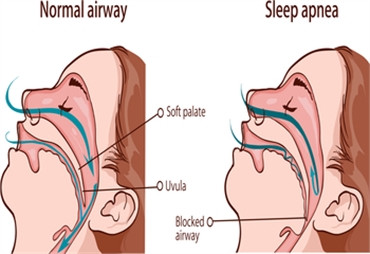How to rectify Sleep Apnea and What is the treatment for it

The Obstructive Sleep Apnea (OSA), Central Sleep Apnea (CSA), and Mixed Sleep Apnea are the three types of the disorder.
Sleep apnea (SA) is a medical disorder related to breathing. The patient unknowingly stops breathing while asleep, and wakes up due to shortness of breath. Breathing gets interrupted hundreds of times, and this not only disturbs sleep but also results in a lack of oxygen for various parts of the body. There are three types of this disorder, complex, central, and obstructive sleep apnea.
The OSA or obstructive sleep apnea is the most common type. In this condition, the patient snores loudly, takes a sudden pause in breathing, and wakes up. Such individuals do not realize they were snoring unless informed by their partner about the same.
Possible causes
Throat muscles offer crucial support to the tongue, the sidewalls, the tonsils, and soft palate. In patients suffering from OSA, the airway narrows as soon as the muscles relax abnormally and reduce the amount of air the patient can breathe. As a result of problems in throat muscles, the body gets a lower amount of oxygen, and the brain signals the individual to wake up from sleep due to the inability to breathe correctly. The awakening is just for a few seconds to reopen the airway, and the patient may not even realize that there was a disturbance in sleep. This can happen as many as thirty times in an hour, impacting the person’s ability to sleep properly.
The deviated nasal septum, lower jaw overbite, and enlarged tonsils can also be among the reasons behind this disorder.
Central sleep apnea is triggered when the person’s brain fails to send proper signals to muscles that handle breathing. Complex sleep apnea is often reported by patients who suffer from both central and OSA. It is also known as treatment-emergent central sleep apnea. Individuals suffering from the same find it difficult to stay asleep for longer.
Side-effects of the condition
If left untreated, this medical condition can trigger other problems like diabetes, heart failure, depression, headaches, stroke, high blood pressure, and worsen ADHD. It can also negatively impact the patient’s ability to perform day to day activities.
Most reported symptoms
Sore throat or a choking sensation, loud snoring, forgetfulness, and a feeling of sleepiness and tiredness throughout the day are some of the symptoms reported by patients suffering from SA.
Diagnosing the condition
A sleep medicine physician or an experienced dentist asks questions concerning the patient’s sleep history and symptoms. Along with physical examination, the health care professional may ask the patient to undergo a sleep study, diagnostic polysomnogram, or sleep apnea test to determine if the person is suffering from SA.
If required, the physician or dentist may recommend a blood test to check the oxygen level and examine the throat for enlarged tonsils and adenoids.
Sleep apnea treatment options
There are several treatment options, and the physician recommends the same depending on the patient’s medical history and the severity of the condition.
Lifestyle changes, including avoiding sleeping pills, alcohol consumption, quitting smoking, changing sleeping positions, and taking efforts to lose weight, are crucial.
CPAP mask-based treatment is one of the most recommended options. The patient needs to sleep with the mask that ensures a constant flow of air to the nose. Dentists may also recommend other oral appliances or devices, including mouthguards and upper airway stimulators, designed to help patients suffering from SA.
In severe cases, the expert might suggest the patient to undergo nasal surgery, mandibular maxillomandibular advancement surgery, and somnoplasty. Sleepiness can be handled with medications like solriamfetol (Sunosi).
Interesting facts
More than 22 million Americans and 3.9 million Brits suffer from this medical condition. Studies point out that the disease affects more men than women. The ration is about 2:1. Obese and overweight persons remain more prone to SA. The medical condition’s severity can be reduced with bariatric surgery and caloric restriction.
A study published by the Journal of Clinical Sleep Medicine has recently highlighted that OSA can cause adverse outcomes in the case of COVID-19 infection. Researchers are carrying out further studies on the link. However, findings do make sense as sleep deprivation has been linked to an increased risk of pneumonia previously. Thus, opting for treatment at the right time has become more crucial.
Getting proper sleep is crucial during the current era of coronavirus pandemic. If you and your partner experience symptoms and feel you are suffering from sleep apnea, you can approach your physician or dental office for a checkup. Ignoring the problem or delaying the treatment can worsen the problems with patients during the coming days.

